Nalini Venkatasubramanian
VOILA: Value-of-Information Guided Fidelity Selection for Cost-Aware Multimodal Question Answering
Feb 03, 2026Abstract:Despite significant costs from retrieving and processing high-fidelity visual inputs, most multimodal vision-language systems operate at fixed fidelity levels. We introduce VOILA, a framework for Value-Of-Information-driven adaptive fidelity selection in Visual Question Answering (VQA) that optimizes what information to retrieve before model execution. Given a query, VOILA uses a two-stage pipeline: a gradient-boosted regressor estimates correctness likelihood at each fidelity from question features alone, then an isotonic calibrator refines these probabilities for reliable decision-making. The system selects the minimum-cost fidelity maximizing expected utility given predicted accuracy and retrieval costs. We evaluate VOILA across three deployment scenarios using five datasets (VQA-v2, GQA, TextVQA, LoCoMo, FloodNet) and six Vision-Language Models (VLMs) with 7B-235B parameters. VOILA consistently achieves 50-60% cost reductions while retaining 90-95% of full-resolution accuracy across diverse query types and model architectures, demonstrating that pre-retrieval fidelity selection is vital to optimize multimodal inference under resource constraints.
Shift Happens: Mixture of Experts based Continual Adaptation in Federated Learning
Jun 23, 2025Abstract:Federated Learning (FL) enables collaborative model training across decentralized clients without sharing raw data, yet faces significant challenges in real-world settings where client data distributions evolve dynamically over time. This paper tackles the critical problem of covariate and label shifts in streaming FL environments, where non-stationary data distributions degrade model performance and require adaptive middleware solutions. We introduce ShiftEx, a shift-aware mixture of experts framework that dynamically creates and trains specialized global models in response to detected distribution shifts using Maximum Mean Discrepancy for covariate shifts. The framework employs a latent memory mechanism for expert reuse and implements facility location-based optimization to jointly minimize covariate mismatch, expert creation costs, and label imbalance. Through theoretical analysis and comprehensive experiments on benchmark datasets, we demonstrate 5.5-12.9 percentage point accuracy improvements and 22-95 % faster adaptation compared to state-of-the-art FL baselines across diverse shift scenarios. The proposed approach offers a scalable, privacy-preserving middleware solution for FL systems operating in non-stationary, real-world conditions while minimizing communication and computational overhead.
OptiSeq: Optimizing Example Ordering for In-Context Learning
Jan 25, 2025Abstract:Developers using LLMs in their applications and agents have provided plenty of anecdotal evidence that in-context-learning (ICL) is fragile. In addition to the quantity and quality of examples, we show that the order in which the in-context examples are listed in the prompt affects the output of the LLM and, consequently, their performance. In this paper, we present OptiSeq, which introduces a score based on log probabilities of LLM outputs to prune the universe of possible example orderings in few-shot ICL and recommend the best order(s) by distinguishing between correct and incorrect outputs resulting from different order permutations. Through a detailed empirical evaluation on multiple LLMs, datasets and prompts, we demonstrate that OptiSeq improves accuracy by 6 - 10.5 percentage points across multiple tasks.
FLIPS: Federated Learning using Intelligent Participant Selection
Aug 07, 2023Abstract:This paper presents the design and implementation of FLIPS, a middleware system to manage data and participant heterogeneity in federated learning (FL) training workloads. In particular, we examine the benefits of label distribution clustering on participant selection in federated learning. FLIPS clusters parties involved in an FL training job based on the label distribution of their data apriori, and during FL training, ensures that each cluster is equitably represented in the participants selected. FLIPS can support the most common FL algorithms, including FedAvg, FedProx, FedDyn, FedOpt and FedYogi. To manage platform heterogeneity and dynamic resource availability, FLIPS incorporates a straggler management mechanism to handle changing capacities in distributed, smart community applications. Privacy of label distributions, clustering and participant selection is ensured through a trusted execution environment (TEE). Our comprehensive empirical evaluation compares FLIPS with random participant selection, as well as two other "smart" selection mechanisms - Oort and gradient clustering using two real-world datasets, two different non-IID distributions and three common FL algorithms (FedYogi, FedProx and FedAvg). We demonstrate that FLIPS significantly improves convergence, achieving higher accuracy by 17 - 20 % with 20 - 60 % lower communication costs, and these benefits endure in the presence of straggler participants.
FedGen: Generalizable Federated Learning
Nov 03, 2022Abstract:Existing federated learning models that follow the standard risk minimization paradigm of machine learning often fail to generalize in the presence of spurious correlations in the training data. In many real-world distributed settings, spurious correlations exist due to biases and data sampling issues on distributed devices or clients that can erroneously influence models. Current generalization approaches are designed for centralized training and attempt to identify features that have an invariant causal relationship with the target, thereby reducing the effect of spurious features. However, such invariant risk minimization approaches rely on apriori knowledge of training data distributions which is hard to obtain in many applications. In this work, we present a generalizable federated learning framework called FedGen, which allows clients to identify and distinguish between spurious and invariant features in a collaborative manner without prior knowledge of training distributions. We evaluate our approach on real-world datasets from different domains and show that FedGen results in models that achieve significantly better generalization than current federated learning approaches.
Concealer: SGX-based Secure, Volume Hiding, and Verifiable Processing of Spatial Time-Series Datasets
Feb 10, 2021
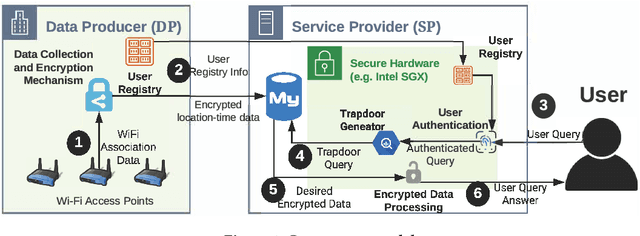


Abstract:This paper proposes a system, entitled Concealer that allows sharing time-varying spatial data (e.g., as produced by sensors) in encrypted form to an untrusted third-party service provider to provide location-based applications (involving aggregation queries over selected regions over time windows) to users. Concealer exploits carefully selected encryption techniques to use indexes supported by database systems and combines ways to add fake tuples in order to realize an efficient system that protects against leakage based on output-size. Thus, the design of Concealer overcomes two limitations of existing symmetric searchable encryption (SSE) techniques: (i) it avoids the need of specialized data structures that limit usability/practicality of SSE in large scale deployments, and (ii) it avoids information leakages based on the output-size, which may leak data distributions. Experimental results validate the efficiency of the proposed algorithms over a spatial time-series dataset (collected from a smart space) and TPC-H datasets, each of 136 Million rows, the size of which prior approaches have not scaled to.
Canopy: A Verifiable Privacy-Preserving Token Ring based Communication Protocol for Smart Homes
Apr 08, 2020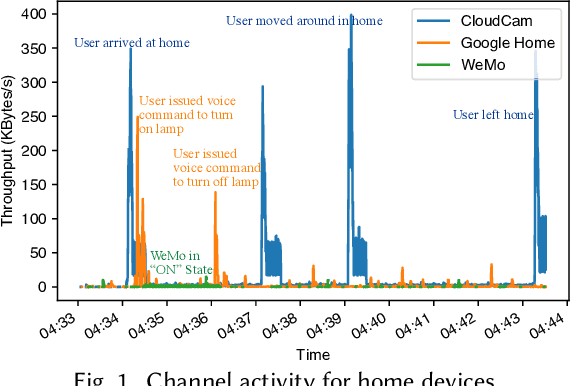
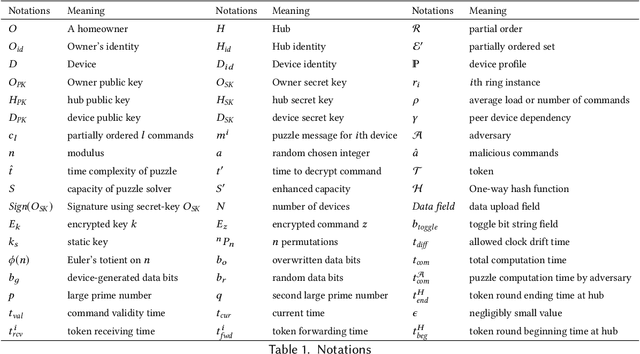

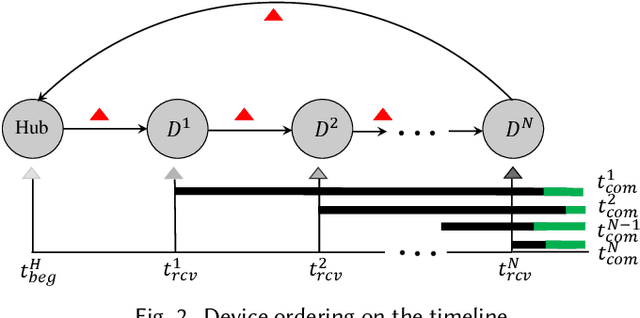
Abstract:This paper focuses on the new privacy challenges that arise in smart homes. Specifically, the paper focuses on inferring the user's activities -- which may, in turn, lead to the user's privacy -- via inferences through device activities and network traffic analysis. We develop techniques that are based on a cryptographically secure token circulation in a ring network consisting of smart home devices to prevent inferences from device activities, via device workflow, i.e., inferences from a coordinated sequence of devices' actuation. The solution hides the device activity and corresponding channel activities, and thus, preserve the individual's activities. We also extend our solution to deal with a large number of devices and devices that produce large-sized data by implementing parallel rings. Our experiments also evaluate the performance in terms of communication overheads of the proposed approach and the obtained privacy.
An Event Based Approach To Situational Representation
Jun 22, 2009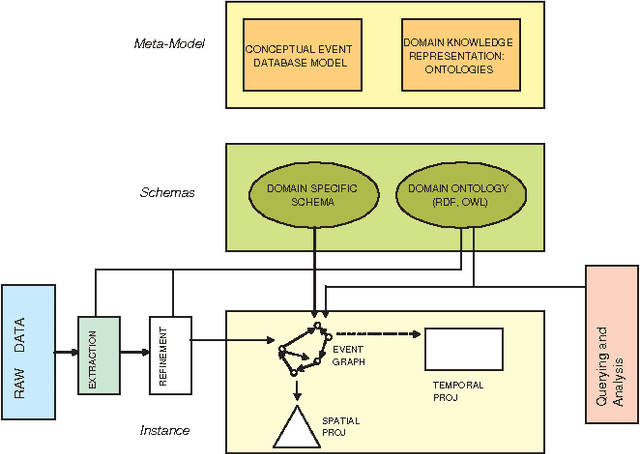
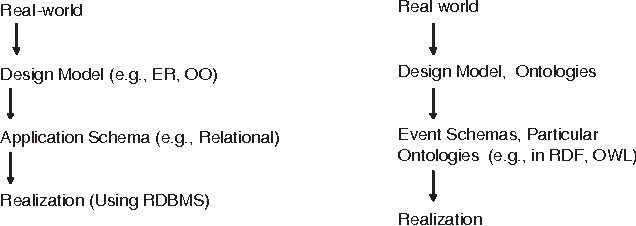
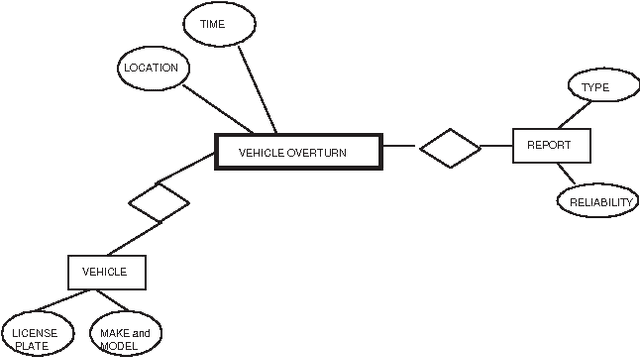
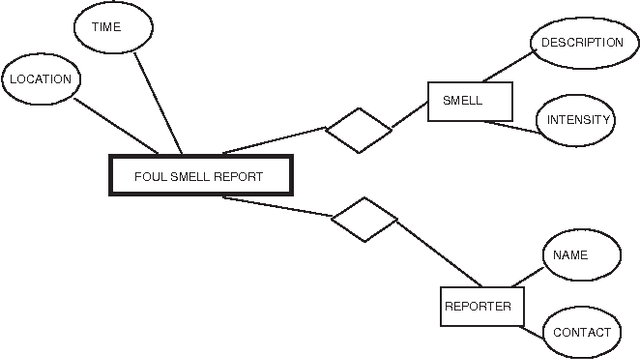
Abstract:Many application domains require representing interrelated real-world activities and/or evolving physical phenomena. In the crisis response domain, for instance, one may be interested in representing the state of the unfolding crisis (e.g., forest fire), the progress of the response activities such as evacuation and traffic control, and the state of the crisis site(s). Such a situation representation can then be used to support a multitude of applications including situation monitoring, analysis, and planning. In this paper, we make a case for an event based representation of situations where events are defined to be domain-specific significant occurrences in space and time. We argue that events offer a unifying and powerful abstraction to building situational awareness applications. We identify challenges in building an Event Management System (EMS) for which traditional data and knowledge management systems prove to be limited and suggest possible directions and technologies to address the challenges.
 Add to Chrome
Add to Chrome Add to Firefox
Add to Firefox Add to Edge
Add to Edge